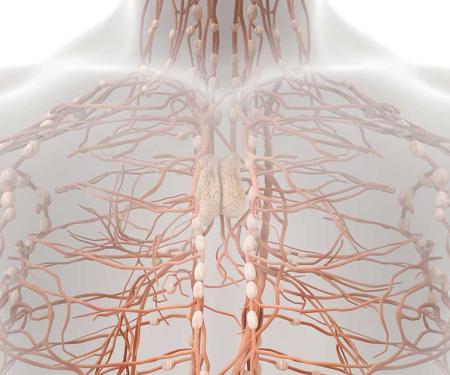Related Articles
00 / 00
Accurate diagnosis is essential for determining the best treatment for your type and stage of lymphoma.
Fox Chase’s hematopathologists—pathologists who specialize in the diagnosis of blood cancers—have vast experience properly diagnosing lymphoma and other blood cancers. These specialists are not available at all healthcare institutions and are most often found at comprehensive cancer centers.
Diagnosis of lymphoma typically requires a biopsy, which is the removal of a tissue sample for testing in a lab. Some patients will undergo an incisional biopsy (which involves removing a smaller sample of tissue), while others may need an excisional biopsy (which involves the removal of an entire lymph node).
After the biopsy, a hematopathologist will run the tissue samples through various tests to look for lymphoma. The hematopathologists may test samples of the patient’s blood or bone marrow as well.
This type of test may also be done by a hematopathologist and involves looking for proteins on the surface and inside of cancer cells (through a process called immunophenotyping). This assesses the type of lymphoma the patient has and whether it affects their B-cells or T-cells.
The presence of lymphoma can cause abnormal changes in chromosomes and genes, and genetic tests for these changes may assist with diagnosis.
Additional tests that may be used as part of the diagnostic process for lymphoma include:
It usually takes at least a few days to receive a test report, although the time varies for each patient. Your physician will provide your results as soon as possible, along with a thorough explanation of your diagnosis and answers to any questions you have. At that time, your physician will recommend a treatment plan tailored to your specific disease.
A lymphoma’s stage describes the extent of the cancer in the body. The staging system used for most lymphomas has four main stages:
The cancer is typically limited to one cluster of lymph nodes in a specific region of the body.
The cancer is in two or more clusters of lymph nodes either above or below the diaphragm.
The cancer is found in lymph tissue both above and below the diaphragm.
The cancer has widely spread outside the lymphatic system to the bone marrow or other organs in the body.
The stage of one’s lymphoma may also be assigned the letter A or B. The letter B indicates the patient is experiencing certain symptoms (such as unexplained fevers, heavy night sweats, and extreme weight loss). The letter A indicates that such symptoms are not present.
If you have already been diagnosed with lymphoma at another healthcare institution, you’ll most likely want to start treatment as soon as possible. But, there is merit in having someone else weigh in on your diagnosis and treatment options.
At Fox Chase, we routinely offer second opinions, which could help identify new treatment options that might be more effective for your condition. Our specialized hematopathologists may also provide additional insight into your diagnosis and either confirm it or re-categorize your specific type of lymphoma.
Coming to Fox Chase also means you’ll likely have greater access to clinical trials appropriate for your condition. Our designation as a Comprehensive Cancer Center by the National Cancer Institute (NCI) means we are part of a network of research centers where hundreds of clinical trials take place every day. The results of studies conducted by Fox Chase doctors have been crucial in advancing our understanding of lymphoma diagnosis and treatment around the world.
If you decide to seek a second opinion at Fox Chase, our nurse navigators will help you gather the information and test results needed for your first appointment. Our specialists will review your pathology report, imaging and medical history thoroughly as they determine your diagnosis and recommended treatment plan.
To design an individualized care and treatment plan, our lymphoma care team draws on the diverse expertise of clinicians in medical oncology, radiation oncology, radiology and pathology. We work together to diagnose your cancer and help you make informed decisions about your treatment.
Your dedicated team also includes nurse navigators, social workers and other specialized support staff. As a key part of your care team, they will provide emotional support and coping strategies for you and your family when you need them most. At Fox Chase, we take enormous pride in providing world-class care for our patients with lymphoma.




